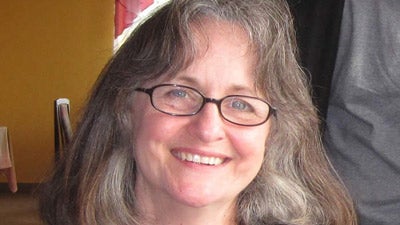Dairy farmer pursues PhD, tackles history of drilling
 When Marcy Ladson and her husband, Jim, purchased their Pennsylvania dairy farm in 1986, they had two things on their minds: cows and tractors. Jim’s father and grandfather had been dairy farmers before him, and they wanted to see the tradition continued.
When Marcy Ladson and her husband, Jim, purchased their Pennsylvania dairy farm in 1986, they had two things on their minds: cows and tractors. Jim’s father and grandfather had been dairy farmers before him, and they wanted to see the tradition continued.
The farm’s previous owners had leased the land’s gas drilling rights, saying it generated a little money to help with taxes. At the time, this meant nothing to the Ladsons. They were simply focused on producing milk.
The Ladsons worked doggedly, like most family farmers do, often rising at 4 a.m. They raised their sons on the land and grew hay and corn for their 120 cows. Eventually, one son enrolled in a college’s environmental studies program, so Marcy started reading his books.
“He would have to come looking for them. I said, ‘Tom, I should be getting credit for this.’ I got hooked, you might say,” she laughs.
Finally, at the age of 50, Ladson did enroll in college. She’d been thinking about what she might want to do when the physical demands of the farm became too burdensome, and she decided to study Pennsylvania’s history and its impact on land use and public policy. The topic could not have been more timely, coinciding with the state’s natural gas boom, which was precipitated by the development of fracking extraction techniques and their use on the region’s gas-rich Marcellus Shale formation.
Around 2010, when interest rates fell, the Ladsons decided to refinance their mortgage. The bank turned up the old gas lease, which had since expired. But Marcy was rattled; by now, thanks to her studies, she knew far more about gas drilling than she had in 1986. She was worried that they had let something slip that would have given someone else control over the family’s land.
When she started her academic journey, Ladson continued working full time on the farm. She drove 60 miles to campus, starting from scratch to pursue her bachelor’s degree. By the time she graduated, she knew she wanted to earn her master’s and doctorate, and she wanted to do it at the University of Pittsburgh—100 miles west of the Bedford County farm—so she could work with Dietrich School history professor Ted Muller, whose expertise was in historical geography.
“I was so happy that Pitt took a chance on me,” says Ladson. “My grades were good and I had a dairy farmer’s work ethic, so I had those things going for me.”
Her dissertation, which she hopes to defend within the next year, explores natural gas drilling during the energy crisis of the 1970s. Pennsylvania experienced a mini gas and oil boom just as the environmental movement was starting to pick up steam. That was when most of the legislation now in place for the Marcellus Shale extraction was established.
Ladson wants to find out how the policies of the past impact what landowners are able to do today. For example, she points out that during the time period she’s studying, “there was absolutely the assumption that the subsurface rights trump the surface rights.” Not all landowners have both. If a company wants to extract gas, a small-farm owner might lease out the rights—as the previous owner of the Ladsons’ farm had done—or they might have no choice when the company takes control using the power of eminent domain.
“They’re my tribe. They’re definitely people that I care about,” Ladson says of rural landowners. “To me, the most pressing environmental story in Pennsylvania is energy extraction.”
Some of her Bedford County neighbors think of environmentalists in stereotypes. “An elitist tree hugger, not concerned with the realities of life,” is how Ladson describes it. She quotes an essay by author Donald Worster: “Are you an environmentalist, or do you work for a living?” But as someone who spent three decades rising before dawn to tend to the cows, Ladson knew she could be both, with credibility.
The road to her PhD has been arduous. After spending the first 30 years of her marriage working all day, every day on the farm side-by-side with her husband, she leased an apartment in Pittsburgh so she could study during the week, returning home to Bedford County every other weekend. It’s not an unusual arrangement where she lives; many other farmers travel long distances to second jobs to make ends meet. The Ladsons' eldest son now works in partnership on the farm, although the family isn’t sure how much longer they’ll own it; destabilization in the milk market has put a lot of small Pennsylvania dairies out of business.
“It’s sad in a lot of ways,” Ladson says of the demise of small family farms. “It might be my next project, if I’m going to go on with the environmental history of Pennsylvania.”
Once she graduates, Ladson hopes to teach, and she hopes her farming background will carry weight with her students. As a teaching assistant, she tries to approach the topic in ways it connects with the students’ lives and give them a more nuanced view of a controversial topic.
“We’re all so polarized these days, it seems like,” she says. “If I can be a bridge between those polar opposites, that would be a good thing.”
